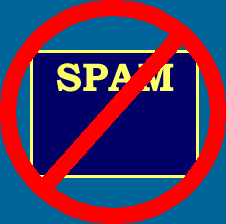 Though the word “spam” has been around for a long time, it’s meaning has gradually changed from one definition to another. Before the age of such widespread computer usage, this word referred to a canned meat product, made mostly of pork. But as more and more people began using computers, this word has taken on an entirely new meaning. Now, the definition that first comes to mind when the word, spam, is heard is as follows:
Though the word “spam” has been around for a long time, it’s meaning has gradually changed from one definition to another. Before the age of such widespread computer usage, this word referred to a canned meat product, made mostly of pork. But as more and more people began using computers, this word has taken on an entirely new meaning. Now, the definition that first comes to mind when the word, spam, is heard is as follows:
In essence, it is junk mail. Junk mail for your email accounts rather than your mailboxes. Many people think that spam was inevitable, based on the examples of our previous forms of communication. It was thought that, since millions of people get junk mail in their mailboxes and telemarketers calling on the phone to try to switch your long distance companies, that this was the natural progression in aggressive advertising.
Everyday, more and more people set up email accounts in order to communicate with friends, family or work and eventually, a spammer will somehow end up with that name on his list. The amount of spam increases daily because the people behind the junk mail keep finding additional ways to access people’s email. When asked about spam, one user said,
Since this increase has started, government has started to get involved in trying to regulate the act of spamming. But even with government intervention, spammers continue to fill our email accounts with unwanted mail. Users must learn how to safeguard themselves against being spammed.***
** Cynthia Abernathy. Personal Interview. June 9, 2001.
***http://email.about.com/internet/email/cs/spamgeneral/index.htm June 8, 2001 .